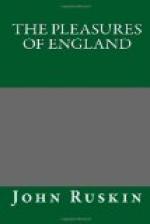And it was precisely, observe, the vivacity and joy with which the main fact of Christ’s life was accepted which gave the force and wrath to the controversies instantly arising about its nature.
Those controversies vexed and shook, but never undermined, the faith they strove to purify, and the miraculous presence, errorless precept, and loving promises of their Lord were alike undoubted, alike rejoiced in, by every nation that heard the word of Apostles. The Pelagian’s assertion that immortality could be won by man’s will, and the Arian’s that Christ possessed no more than man’s nature, never for an instant—or in any country—hindered the advance of the moral law and intellectual hope of Christianity. Far the contrary; the British heresy concerning Free Will, though it brought bishop after bishop into England to extinguish it, remained an extremely healthy and active element in the British mind down to the days of John Bunyan and the guide Great Heart, and the calmly Christian justice and simple human virtue of Theodoric were the very roots and first burgeons of the regeneration of Italy.[1] But of the degrees in which it was possible for any barbarous nation to receive during the first five centuries, either the spiritual power of Christianity itself, or the instruction in classic art and science which accompanied it, you cannot rightly judge, without taking the pains, and they will not, I think, be irksome, of noticing carefully, and fixing permanently in your minds, the separating characteristics of the greater races, both in those who learned and those who taught.
[Footnote 1: Gibbon, in his 37th chapter, makes Ulphilas also an Arian, but might have forborne, with grace, his own definition of orthodoxy:—and you are to observe generally that at this time the teachers who admitted the inferiority of Christ to the Father as touching his Manhood, were often counted among Arians, but quite falsely. Christ’s own words, “My Father is greater than I,” end that controversy at once. Arianism consists not in asserting the subjection of the Son to the Father, but in denying the subjected Divinity.]
Of the Huns and Vandals we need not speak. They are merely forms of Punishment and Destruction. Put them out of your minds altogether, and remember only the names of the immortal nations, which abide on their native rocks, and plough their unconquered plains, at this hour.
Briefly, in the north,—Briton, Norman, Frank, Saxon, Ostrogoth, Lombard; briefly, in the south,—Tuscan, Roman, Greek, Syrian, Egyptian, Arabian.
Now of these races, the British (I avoid the word Celtic, because you would expect me to say Keltic; and I don’t mean to, lest you should be wanting me next to call the patroness of music St. Kekilia), the British, including Breton, Cornish, Welsh, Irish, Scot, and Pict, are, I believe, of all the northern races, the one which has deepest love of external nature;—and the richest inherent gift of




